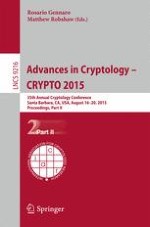
2015 | OriginalPaper | Buchkapitel
A Simpler Variant of Universally Composable Security for Standard Multiparty Computation
verfasst von : Ran Canetti, Asaf Cohen, Yehuda Lindell
Erschienen in: Advances in Cryptology -- CRYPTO 2015
Verlag: Springer Berlin Heidelberg
Aktivieren Sie unsere intelligente Suche, um passende Fachinhalte oder Patente zu finden.
Wählen Sie Textabschnitte aus um mit Künstlicher Intelligenz passenden Patente zu finden. powered by
Markieren Sie Textabschnitte, um KI-gestützt weitere passende Inhalte zu finden. powered by